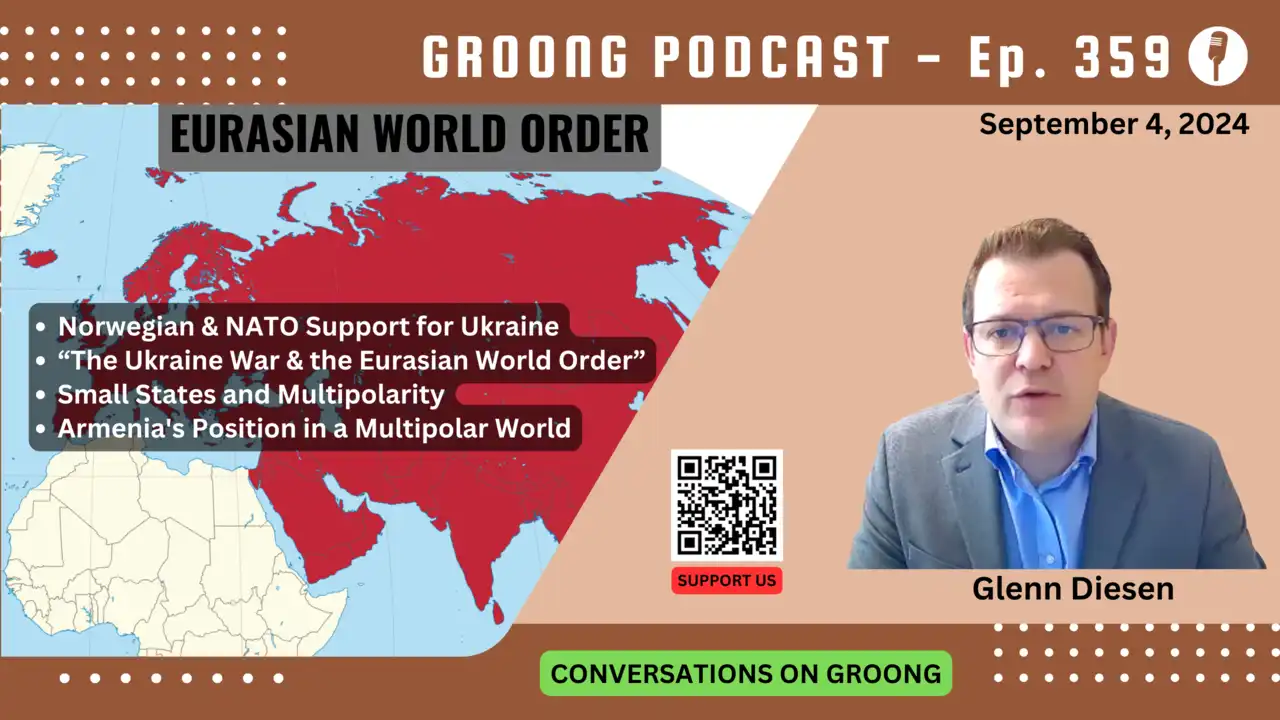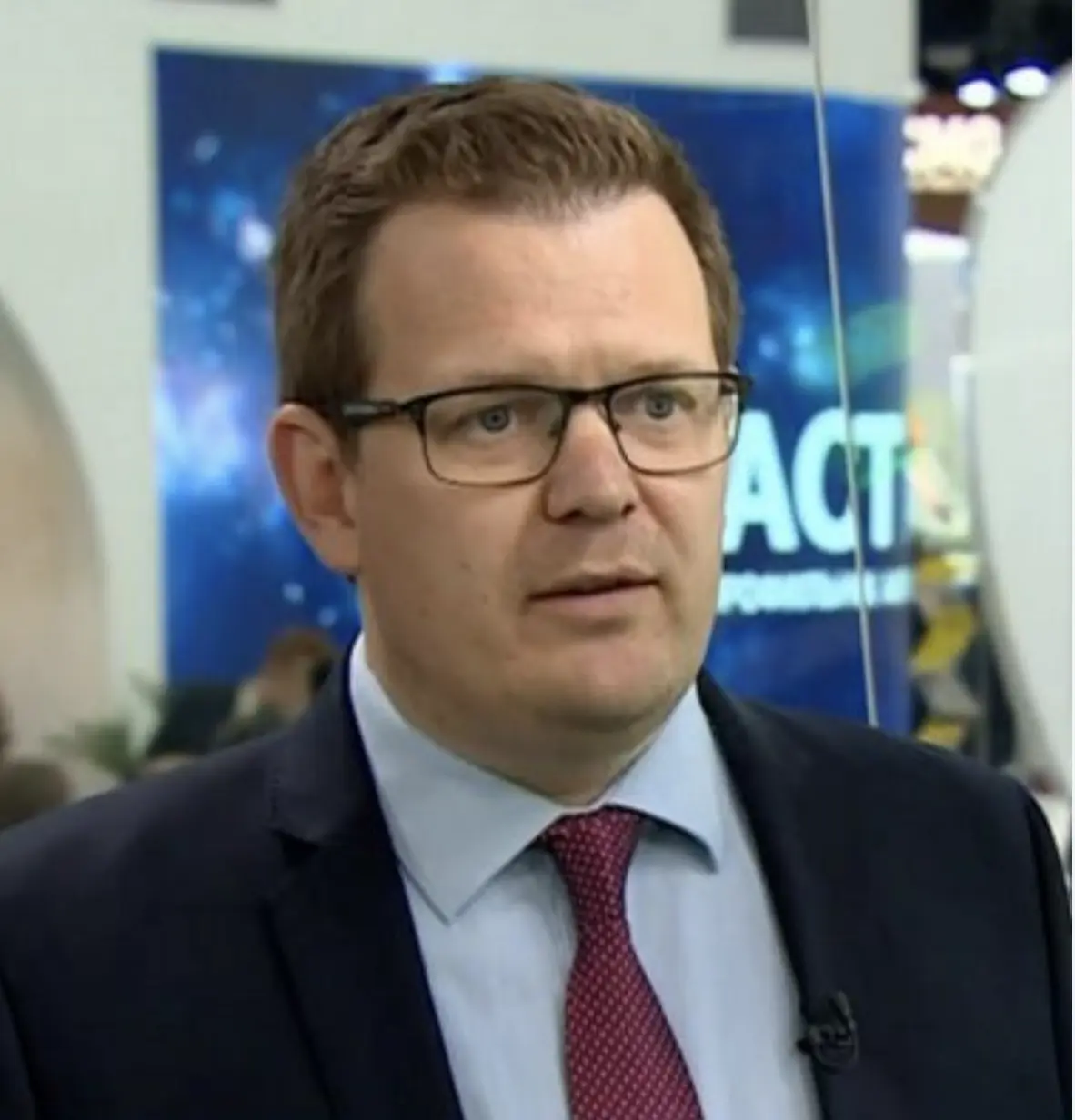
Groong Links:
Guest:
Topics:
- Norwegian & NATO Support for Ukraine
- “The Ukraine War & the Eurasian World Order”
- Small States and Multipolarity
- Armenia’s Position in a Multipolar World
Episode 359 | Recorded: August 30, 2024
Show Notes
Russia and The Eurasian World Order
It is the first time that you’re on our podcast. Obviously, in academia, especially in international relations, you’re a well known name. Can you introduce yourself to our audience?
Questions:
- How did you decide to go into a career in academia in international relations? Was it always your first choice?
Now let’s talk about the Ukraine war in more detail.
You live in Norway, which is a NATO member and a major supporter of Ukraine in this current war. In 2022 and 2023 combined, Norway provided over $3B (30.6B NOK) in aid to Ukraine and has pledged to provide significantly more in coming years. This includes military support, such as F16 fighter jets.
Questions:
- What is driving Norway’s international policy towards supporting Ukraine?
- What is the level of popular support among Norwegians for the current government’s foreign policy towards the war in Ukraine?
Prof. Diesen, in 2023 you published your book called “The Ukraine War & the Eurasian World Order”. The book was well received. It currently has a 4.7 rating on Amazon and has received glowing reviews from a number of well-known names, including John Mearsheimer, who said this book is a “ must read for anyone who wants to understand the great shift in the global distribution of power that is taking place before our eyes."
Questions:
- Can you describe the main thesis of your book for our listeners?
- Does having a multipolar world order mandatorily mean more traditional values (as opposed to liberal values) internally?
“Ukraine is on its last leg!”, or at least that is what many commentators were saying, BEFORE Ukraine made a brazen attack against Russia on August 6, and actually captured territory in the Kursk oblast in Russia, which it has been able to hold so far.
Questions:
- Is Ukraine really on its last leg?
- What was the logic for the attack on Kursk?
- Will Russia retaliate? What is Russia’s next step on the escalation ladder?
Reportedly Zelensky will be presenting a “victory plan” to the US. Some call this a “peace plan”, others say it’s a shopping list for more military aid backed with a show of victories inside Russia proper.
Questions:
- How do you see this conflict resolving at some point?
- What role can the upcoming superpowers, China and India, have in resolving this Russia-West conflict? And how can they help contain it from exploding into an all-out world war?
Armenia’s Security Dilemma
Small States
When talking about the incoming world order that’s being established, we frequently discuss the orientation of major states: superpowers and regional powers. But given that we’re Armenian and we care about Armenia, let’s talk about the plight of small states
Questions:
- You argued that a multi-polar world order could lead to more stability. How does this work for Armenia?
- In general will smaller states have more or less sovereignty in a new multi-polar world?
- Some have speculated that some smaller states may disappear from the map in the coming world order. What are your thoughts on that?
Everywhere you look, there seems to be a tendency for countries to gravitate away from the US hegemonic order. In our South Caucasus neighborhood:
- Georgia appears to be sidetracking from its “European” integration.
- Azerbaijan, which in the past was part of the non-aligned movement, is now applying to join BRICS.
- Even Turkey is pursuing a much more independent policy than in the past and there’s also talk of Turkey joining BRICS.
Questions:
- What is Armenia’s role (or should we say “fate”) in this new multipolar future?
- How can one explain the path that Pashinyan is pursuing? Is it a rational policy?
- Pashinyan team is pushing “Europe”.
- Pashinyan team is very much avoiding purchasing weapons from Iran or doing military exercises with Iran, because it would violate US red lines
- Given multipolarity, Armenia has 3 major neighbors, Russia, Turkey and Iran. None of them want US influence in the region. Turkey is inimical to Armenia but still a US/NATO partner.
- How will conflicts like Armenia and Azerbaijan get resolved in multipolarism?
- Sure, the role of institutions is less, but is it completely gone?
- Wouldn’t this lead to anarchy?
44 Day War
After the 44-day war, Armenia lost a lot of agency on the international scene. It seems like instead of sitting at the table, Armenia now is on the menu.
**Questions: **
- Was Karabakh a trap for Russia and a prelude to the war in Ukraine?
- How much agency does Armenia have over its own fate?
- Did Turkey make use of NATO’s Intelligence, Surveillance and Reconnaissance (ISR)
Alright, we’ll leave it there for today! Thank you Dr. Diesen!
Wrap-up
That’s our show today, this episode was recorded on August 30, 2024.
tags = [“Glenn Diesen”, “Eurasian World Order”, “NATO”, “Ukraine War”, “Eurasian World Order”, “Multipolarity”, “Armenia”, “Dr. Glenn Diesen”, “international relations”, “small states”, “Norway foreign policy”, “military aid”, “Ukraine military strategy”, “Kursk Offensive”, “Russia”, “China”, “India”, “Armenia security dilemma”, “South Caucasus”, “Georgia”, “Azerbaijan”, “Turkey”, “BRICS”, “Pashinyan”, “Armenia-Iran relations”, “Armenia-Azerbaijan Conflict”, “44 Day War”, “Karabakh”, “Donetsk”, “Donbass”]
Guests

Glenn Diesen
Dr. Glenn Diesen a professor at the University of South-Eastern Norway, and associate editor at Russia in Global Affairs, and editor of Political economy, Russian foreign policy and Eurasian integration.
Glenn Diesen has authored several influential books that explore the geopolitical shifts in the modern world, with a particular focus on Russia’s role in the emerging global order. His works include “The Think Tank Racket: Managing the Information War with Russia”, which critiques Western think tanks and their influence on public perception and policy. “In Europe as the Western Peninsula of Greater Eurasia”, he examines the strategic implications of Eurasian integration and Europe’s changing role in the global power structure. “Russian Conservatism: Managing Change under Permanent Revolution” delves into the ideological foundations of Russian conservatism and its impact on domestic and foreign policy. Diesen’s books collectively provide a nuanced understanding of the interplay between economics, ideology, and geopolitics, offering fresh perspectives on the reconfiguration of global power and the West’s engagement with Russia
Hosts

Hovik Manucharyan
Hovik Manucharyan is an information security engineer who moved from Seattle to Armenia in 2022. He co-founded the ANN/Groong podcast in 2020 and has been a contributor to Groong News since the late 1990s.
Disclaimer: The views expressed by Hovik Manucharyan on the ANN/Groong podcast are his own and do not necessarily reflect the opinions of his employer or any other organization.

Asbed Bedrossian
Asbed Bedrossian is an IT professional, and for years oversaw the central IT enterprise infrastructure and services at USC. His decades of experience spanned across IT strategy, enterprise architecture, infrastructure, cybersecurity, enterprise applications, data center operations, high performance computing, ITSM, ITPM, and more.
Asbed founded the Armenian News Network Groong circa 1989/1990, and co-founded the ANN/Groong podcast in 2020.